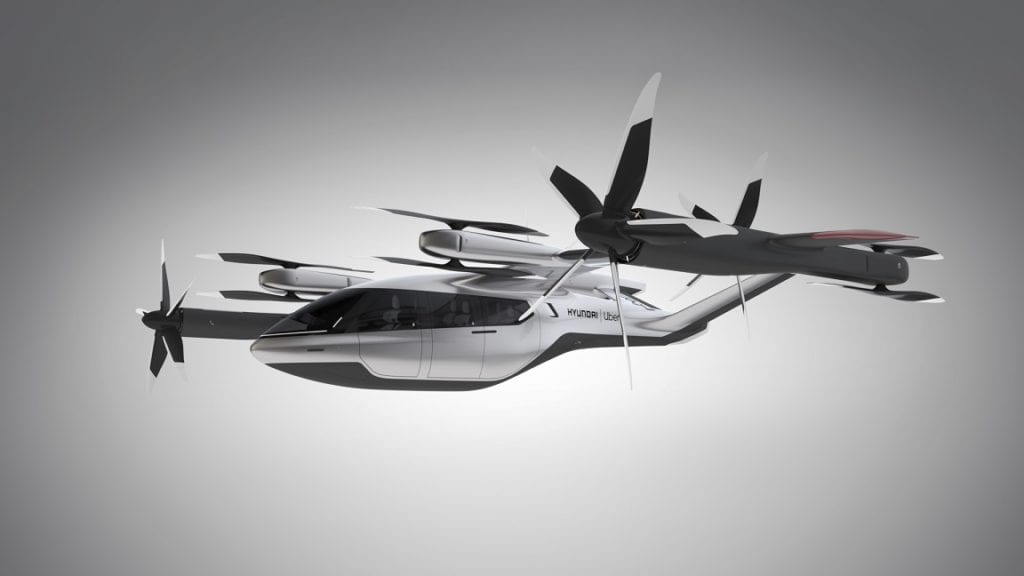
Hyundai unveiled its S-A1 eVTOL design at this year’s Consumer Electronics Show and announced it would join Uber Elevate. (Hyundai/Uber)
Hyundai unveiled an electric VTOL aircraft concept, called the ‘S-A1’, that it plans to certify and mass-produce by the late 2020s. The automaker also joined Uber Elevate, the rideshare giant’s air taxi ecosystem, as the eighth vehicle partner and the first to come from an automotive company.
The S-A1, a mockup of which was on display at the Consumer Electronics Show in Las Vegas, is an all-electric aircraft with four stationary rotors for takeoff and landing and four tilting rotors for wing-borne lift in cruise. Hyundai intends the aircraft to reach speeds up to 180 miles per hour, a maximum cruise altitude of 1,000-2,000 feet, and make trips up to 60 miles while carrying four passengers plus luggage. The aircraft will have a parachute deployment system.
“There are currently about 25,000 commercial airplanes flying around the world,” Jaiwon Shin, head of Hyundai’s urban air mobility division, said at CES. “We believe the [UAM sector] will well exceed this number once it matures fully. At Hyundai, we know how to mass produce high-quality vehicles with cost efficiency and reliability, which is a key enabler for reducing overall operating costs.”

The S-A1 uses four static rotors and four tilting rotors to achieve VTOL capability and up to 180 mph cruise speed. (Hyundai/Uber)
In October, Hyundai announced the formation of its UAM division and hired Shin, a longtime NASA aeronautics director, to lead it at the executive vice president level. Though Hyundai is one of many automakers with investments in the UAM space, its strategy may be the most purposeful and articulated; alongside the S-A1 concept, Hyundai unveiled ‘purpose-built vehicles’ and hubs meant to connect UAM aircraft with ground transportation as well as help riders make better use of their time in transit. SangYup Lee, head of Hyundai’s global design center, stressed that people must have “easy access to UAM.”
Hyundai’s S-AI joins Uber Elevate as its eighth aircraft partner, following Joby Aviation — the only partner publicly committed to meeting Uber’s timeframe for commercial operations in 2023 — which announced their partnership in December. An Uber representative confirmed to Avionics International the company isn’t concerned with Hyundai’s longer timeframe; Uber intends to launch rideshare services with whichever partner vehicles are certified and add new aircraft as they become safely available.
 | Want more eVTOL and air taxi news? Sign up for our brand new e-letter, “The Skyport,” where every other week you’ll find the most important analysis and insider scoops from the urban air mobility world. |
“Hyundai has developed a bold new design, optimized for the Uber Elevate mission, and we’re really excited to see that their approach builds on many of the innovative design concepts that we’ve explored at Elevate and released publicly to show the potential of distributed electric propulsion,” said Eric Allison, head of Uber Elevate.
“Hyundai is Uber Elevate’s first vehicle partner with capabilities to manufacture at automotive scale, and we believe Hyundai has the potential to build Uber air taxis at rates not possible in the current aerospace industry,” Allison added.
Hyundai’s vision for urban air mobility, including its hubs and ground vehicles, do not fit into the Uber Elevate ecosystem, for which an Uber representative confirmed the company intends to pursue Skyports constructed, for example, out of existing parking garages. Hyundai’s vehicle partnership with Uber is not exclusive, however, so the company may pursue UAM deployment concepts outside of Uber’s vision.